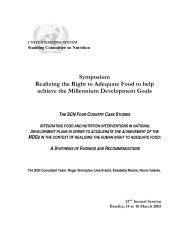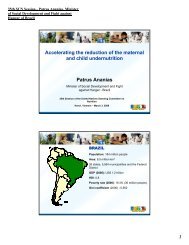28FEATURESwww.unsystem.org/scnAchieving and Sustaining <strong>USI</strong>: Successful Voluntary Action to Catalyzea Global Health Public Endeavour. The Kiwanis International ExperienceRobert Parker (Kiwanis International)Abstract: In 1994, Kiwanis International set a goal to raise US$75 million to virtually eliminate the world’s most prevalent,preventable cause of mental retardation:, iodine deficiency disorders (IDD). As of 2007, Kiwanis has raised and leveragedcontributions of nearly $100 million. The selection of a cause that fit the organization’s purpose and resources wasimportant to the ultimate success of Kiwanis International’s first Worldwide Service Program. Kiwanis chose the eliminationof IDD because the science was known, the solution was extremely cost-effective, the amount of money neededwas within the membership’s capability to raise funds, and the solution would permanently improve the futures of millionsof children. A global fundraising campaign was a new experience for the traditionally locally-focused Kiwanis clubsand their members; so, the Kiwanis International Foundation honored IDD contributors through existing donorrecognitionprogrammes, to which the members already were accustomed. Kiwanis’s partnerships, such as thoseformed with UNICEF and salt producers, established Kiwanis as a major participant in global efforts to help children.Key words: Fund, IDD, iodine, iodization, Kiwani, raising, salt, service project, <strong>USI</strong>, voluntaryIntroduction: first worldwide service projectFounded in 1915, Kiwanis International develops and inspires everyday leaders to ensure a legacy ofimpactive service. It is joined in this mission by the rest of the Kiwanis organization:▪ Kiwanis Kids, elementary school students of ages 6-10▪ Builders Club, middle school students of ages 10 to 14▪ Key Club, high school students of ages 14 to 18▪ Circle K, college and university students▪ Kiwanis Junior, young adults in Europe▪ Aktion Club, an organization of adults who have disabilities▪ Kiwanis International Foundation▪ Key Leader, a life-changing experience designed to promote personal growth and community-building to abroad spectrum of students, not just academic achievers.Today, the Kiwanis organization includes nearly 600,000 leaders in more than 70 nations (Kiwanis 2007).Kiwanis International is governed by a Board of Trustees, the members of which are elected by clubdelegates attending the organization’s annual convention. The clubs, however, are virtually autonomous andchiefly governed by their own boards. Hence, Kiwanis clubs traditionally serve the needs of their owncommunities. Prior to 1990, however, Kiwanis clubs had never joined together to address a specific globalservice need (Hapgood 1989).Expanding Kiwanis’ field of serviceOn October 1, 1990, then-Kiwanis International President Wil Blechman, MD, led the development of a threeyearinitiative titled, “Young Children: Priority One,” to promote programmes supporting health and educationamong children: prenatal to five years old. The new project led to contacts with like-minded organizationsincluding the Carter Center in Atlanta, Georgia. During a visit to the Carter Center, Dr. Blechman met Dr.William Foege, the Executive Director of the Task Force for Child Survival and Development and former chiefof the Centers for Disease Control and Prevention, who urged Kiwanis to help the children of the world. Hesuggested that a Kiwanis representative attend two UNICEF meetings in Montréal, Québec: “Protecting theWorld’s Children: Keeping the Promise” and “Ending Hidden Hunger.”Blechman was appointed as Kiwanis’ representative to both meetings and returned to communicateUNICEF’s request that Kiwanis International take up a global cause on behalf of the world’s children. Amongthe potential causes were clean water, medication and micronutrient deficiencies. With the KiwanisInternational Board’s support, a resolution to develop a worldwide service project was approved by the Houseof Delegates at the 1993 Kiwanis International Convention in Nice, France.SCN NEWS # 35 back to contents
www.unsystem.org/scn FEATURES 29After extensive evaluation and discussion, including member surveys, focus groups and interviews, theKiwanis International Board submitted a proposal to the next House of Delegates to join UNICEF in its effortto virtually eliminate iodine deficiency disorders (IDD) throughout the world by year 2000. Kiwanis chose theelimination of IDD because the science was known, the solution was extremely cost-effective, the amount ofmoney needed was within the membership’s capability to raise funds and the solution would permanentlyimprove the futures of millions of children. Borne on this momentum, the House of Delegates, convened atthe 1994 Kiwanis International Convention in New Orleans, Louisiana, overwhelmingly gave its approval tothe Worldwide Service Project to protect newborns and young children from IDD (Anonymous 1994a).Evolution of Kiwanis’ first worldwide service projectAt the beginning of the project, Kiwanis’ intended role was primarily that of fund raiser. Kiwanis Internationalinitially agreed to raise US$50 million but increased its goal to US$75 million in order to build salt-iodizingplants for the world at an average unit price of US$50,000. Before long, it became clear that the needs ofIDD-elimination programmes varied from one country to another. Most of the governments sought advice andassistance for public education, advocacy and legislation. They needed financial help to upgrade small, localsalt producers and salt quality, as well as to procure iodine. The smaller countries in the developing worldhad little use of large, modern salt factories that required advanced technology to operate and maintain.Kiwanis shifted its campaign strategy to emphasize the number of children’s lives saved. Kiwaniscontributions would not only purchase equipment, but they would also support legislative advocacy; educatesalt manufacturers, health officials, salt merchants, families and communities; and support monitoringprocesses. Every five cents donated represented one child’s life protected from iodine deficiency. Though thisnickel-per-child approach could be interpreted in various ways, the five-cent rescue of one child proved moremotivating than $50,000 per salt-iodization machine.To meet the challenge of collecting, acknowledging and dispersing donations, Kiwanis International partneredwith the Kiwanis International Foundation. The Foundation already had two popular recognitionprogrammes—the George F. Hixson Fellowship and the Tablet of Honor—both of which were used to buildup the Foundation’s unrestricted fund. But the Foundation opened these two prestigious programmes torecognize Worldwide Service Project donors. For Kiwanis clubs not accustomed to personal donations forglobal service, the Foundation’s decision would prove to be one of the most effective incentives towardencouraging members’ contributions (Anonymous 1997a).One of Kiwanis’ first challenges was to educate its officers and members about IDD. Most Kiwanis leaders—about 80%—live in North America, where goitre and other iodine deficiency disorders had been virtuallyeliminated decades earlier. But Kiwanians needed to learn that beyond the physical deformity of goitre, IDDcaused worldwide human suffering and was an obstacle to social and economic development within families,communities and whole nations.Through articles in the organization’s official publication, KIWANIS magazine, Kiwanians began to learn thatIDD was the world’s leading cause of preventable mental retardation. They read about cretinism and IDD’seffects on children’s academic performance. They learned about salt production, packaging, distribution andmarketing. Kiwanis convention speeches, forums and exhibits described and illustrated the myriad problemsassociated with iodine deficiency and motivated attendees to support the Worldwide Service Project—for thechildren of the world. In his role as honorary chairman of Kiwanis Worldwide Service Project Committee, actorand UNICEF Goodwill Ambassador Roger Moore attended many Kiwanis conventions, reporting on theworld’s progress against iodine deficiency and encouraging Kiwanians to continue the fight. Other celebritieslent their name and advocacy to Kiwanis (Anonymous 1994b). Actor and artist James Kiberd, a US Fund forUNICEF ambassador, dedicated his artwork All It Takes Is a Teaspoon—All It Takes Is You to the cause, andprints were offered as recognition rewards to large gift contributors (Anonymous 1996). The athletes of theWomen’s Tennis Association (WTA) videotaped public service announcements and staged autograph eventsat WTA tournaments (Anonymous 1997b). TV news broadcaster Hugh Downs chose IDD as the subject forhis farewell 20/20 newsmagazine report, for which he interviewed High Point, North Carolina, Builders Clubback to contents SCN NEWS # 35







